Home \ Health Education Projects \ Total Control of the Epidemic Project in Yuexi County, Sichuan Province
Background:
HPP China opened a new TCE project which is supported by World Bank Fund with a special focus on improving Sexual and Reproductive Health (SRH) outcomes of the local Yi Minority population in Yuexi County of Liangshan Prefecture. The project established a very good cooperation with Yuexi Women Federation, Public Health Bureau, AIDS Office, CDC and Maternal Child Health station. The cooperation contract between The World Bank and The Federation for Associations connected to the International Humana People to People Movement, Yunnan Office (FAIHPPYO) was signed on 10th March 2014. The project conducts one-on-one door-to-door visits to all resident villagers, bringing health education and mobilizes them to accept voluntary home-based HIV/AIDS counselling and home testing. Furthermore, a Passionate network, local leaders and influential people will be trained and mobilized to support the information dissemination and community mobilization work – they will be the ones enhancing the community’s awareness and knowledge to maternal and child healthcare and reproductive health. We believe this is the effective approach to improve the health condition of Yi women and children in the region.
Project Implementation:
The project team was set-up and the implementation started on 27th June 2014. Taking into account Yuexi County Health Bureau and Yuexi Women Federation’s recommendation, we chose 5 townships as project fields: Zhongsuo, Shugu, Naituo, Datun and Matuo Townships. In August, Project Leader Agen Riga and Field Officers (FO) received the home testing certificates issued by local Health Bureau and CDC which permits them to conduct the rapid HIV home testing. At the same time, we finalized the baseline survey, organized baseline training, assigned survey to each township, and demonstrated in the field.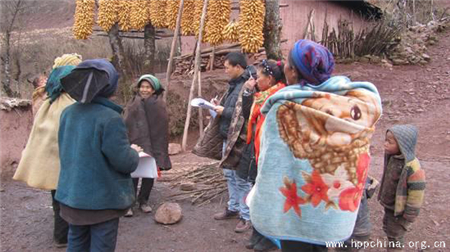
The project leader Agen Riga (the male) is providing health training for a women self-support-group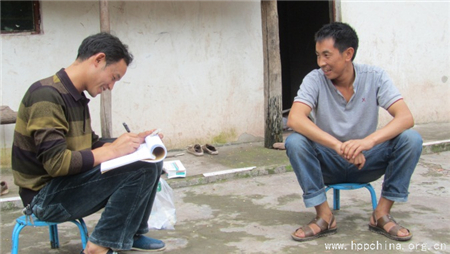
Field officer is conducting one-on-one door-to-door visit.
Rapid HIV home testing:
Normally FOs encounter two different situations when they visit households, either the villagers voluntarily accept HIV home testing or they refuse to. Assuming each FI has 5 households visit each day (an average of 2.5 people in each household), the procedure is as follows: firstly, an introduction on knowledge of HIV/AIDS within 10 minutes; secondly, rapid HIV home testing and referral mobilization within 20 minutes; the testing process is 30 minutes plus 10 minutes of counselling. In the case that the testing result is positive, we mobilize the person to be referred to the township clinics to get re-tested and confirmed, so that they can register into the national HIV/AIDS system and receive treatment. If the testing result is negative, we also inform the person and provide the necessary prevention knowledge.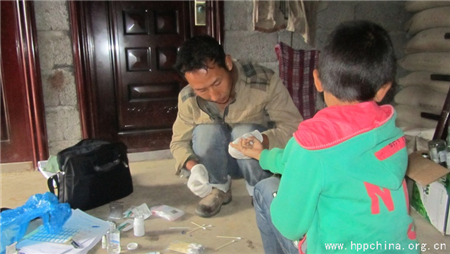
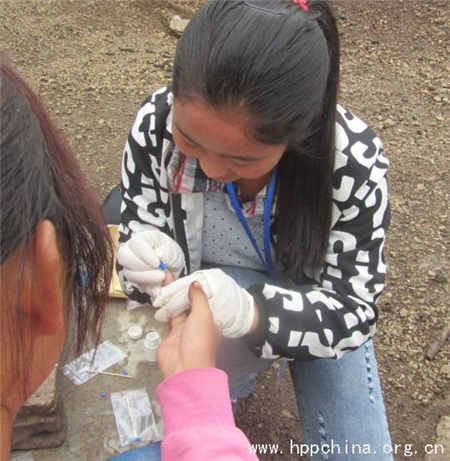
Left: A boy is taking a rapid HIV home testing by a field officer.
Right: A lady is taking a rapid HIV home testing by a field officer.
A field officer’s work:
The project has 8 Field officers – of which 5 are women. Women make up the majority of field officers in this HIV work in Yuexi, Liangshan.
Qumu Nigumo (Yi) is a TCE field officer (hereinafter referred to as FO) in Shugu Township. She is qualified after she finished the training by project leader in August 2014. Her work is to do home visits, face to face education and to mobilize villagers to take rapid HIV home testing at each household in each natural village of Shugu Township. Then refer preliminary positive cases to the township health clinic, where people can register into the national HIV/AIDS system.
In November December and January, rapid home testing has to be stopped due to the cold weather. Therefore FOs mainly work on visiting households, doing counselling work and organizing health education trainings.
On an average day, Qumu takes care of her housework then prepares HIV/AIDS prevention and control promotion materials and forms in the early morning. Then she sets out on foot to travel 3 kilometers to meet Agen Riga (Project leader) and Jizi Niuzi (Project Officer) at Lepin Village Village Center. Today they are going to give out winter clothes which were sent from HPP Beijing office; after loading the clothes on the carriage, the three keep walking up to the mountain.
They arrived to the top Mukuku Village Group 2 about 11:00. They started home visits, led by Qumu. It is a common situation among the villages that young people are away working in cities and most people remaining in the villages are left-behind children, women and elderly. After the home visits, Qumu organized two trainings with 10-20 women each time. Training content includes: HIV/AIDS prevention knowledge, antiviral treatment; condom instructions; reproductive health knowledge, the benefits of hospital delivery, the benefits of folic acid, the treatment of venereal disease, etc. Qumu presents the information in a way which is easily understood, the local women gave her good feedback for her vivid training. After that they gave out clothes to anyone in need.
They almost finished the day’s work at 15:00 in the afternoon, then they walked down the mountain and discussed about work, today’s results and necessary improvements in her method of mobilization, finally at 16:00 they reached town and had their 2nd meal - lunch and supper combined - in town.
Qumu was back home at 17:00, then started planning tomorrow’s field visits and promotion materials, she called and informed the village head and then read over the Mandarin material, as tomorrow’s village is a Han Chinese village. After all these preparations she called it a day.
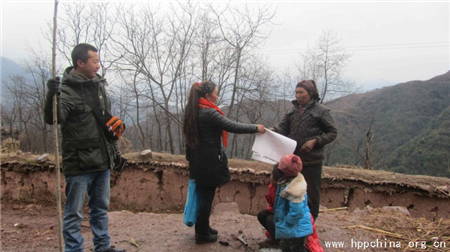
Qumu Nigumo (second left) is giving out health promotion materials to a villager
Project achievement in 2014:
• Home visit to 4956 households, 14239 people accepted HIV/AIDS knowledge and reproductive health knowledge and education
• 11420 people (80.2%) accepted consultation, 5008 people (35.2%) have voluntarily accepted Rapid HIV home testing
• 36 cases of HIV positive results (20 males, 16 females), 19 cases confirmed, 17 cases are in the process of diagnosis confirmation
• Provide women and children health care training for 154 pregnant women, 100 among the 154 accepted Rapid HIV home testing and consultation, none were tested HIV positive
• Implemented 23 trainings in schools for 1087 students
• Implemented 86 Township Level trainings for 1405 people
• Trainings for Women's Federation’s key people 54 person-times
• 2 Inter-departmental working seminars were held
• 9203 condom distribution for free
• Mobilized and trained 361 community volunteers
• Assisted local women found 143 self-support-groups
• Provided support and help to 112 HIV families